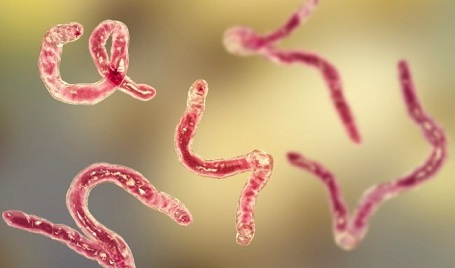U.S. NIH Study Finds That Previous Hookworm Infections Could Prevent COVID-19 Disease Severity!
Thailand Medical News Team Aug 15, 2023 2 years, 5 months, 2 weeks, 6 days, 11 hours, 43 minutes ago
COVID-19 News: The global impact of the COVID-19 pandemic has been characterized by varying degrees of severity across different regions. An intriguing phenomenon emerged, capturing the attention of scientists and researchers alike: certain populations in Africa and Asia appeared to experience milder cases of COVID-19, marked by fewer hospitalizations and deaths. This enigma prompted a team of experts to explore an unconventional theory, linking the presence of endemic hookworm infections to potential protection against severe SARS-CoV-2 symptoms. Delving into the complex interplay between infections and immune responses, their study sheds new light on the mechanisms that might have influenced the pandemic's course.
 The Curious Concept of "Infection Interference"
The Curious Concept of "Infection Interference"
The notion of "infection interference" is a fascinating phenomenon that has been observed for decades. In the 1960s, scientists noted that a viral infection could render an individual temporarily resistant to subsequent infections. This concept gained renewed prominence during the COVID-19 pandemic, with reports of individuals recovering from SARS-CoV-2 infections showing a brief period of immunity to other respiratory viruses. Dr Kerry Hilligan, a dedicated Postdoctoral Research Fellow at the Malaghan Institute, was captivated by this phenomenon and sought to investigate whether hookworm infections could trigger a similar protective effect against severe COVID-19 symptoms.
Tracing the Hookworm Connection
Collaborating with colleagues from the National Institutes of Health in the United States, Dr Hilligan embarked on a groundbreaking study to explore the potential links between hookworm infections and COVID-19 resilience. The study team were particularly intrigued by the observation that regions with endemic hookworm infections seemed to fare better in the face of the pandemic.
Countries in Africa and Asia consistently reported lower rates of severe infections, hospitalizations, and deaths, even after accounting for potential confounding factors and reporting discrepancies.
A Mouse Model Unveils the Mechanisms
To delve into the intricacies of this potential connection, the study team turned to a mouse model. Mice were deliberately infected with hookworms (N. brasiliensis), and their immune responses were meticulously studied. The choice of mice as a model organism was strategic, given the striking similarities between their immune systems and those of humans. This allowed the scientists to gain valuable insights into the potential mechanisms underlying the observed phenomenon.
The Transformative Role of Macrophages
As the study progressed, a remarkable discovery emerged: hookworm infections induced a profound transformation in a specific type of immune cell known as macrophages. These macrophages, found within the lungs, exhibited a distinct transcriptomic profile - the genes they expressed were notably different from those of macrophages unaffected by hookworm infections. This transformation endowed the macrophages with an enhanced ability to detect and respond to impending threats, such as the SARS-CoV-2 virus.
A Symphony of Immune Responses
The macrophages, now primed by hookworm infections, played
a pivotal role in orchestrating a powerful immune response against COVID-19. When the virus entered the lungs, the modified macrophages released specialized chemical signals that acted as a call to arms. These signals prompted the recruitment of CD8 T-cells, a specialized type of immune cell renowned for its proficiency in eradicating viruses. The recruitment process was expedited, resulting in the swift clearance of the virus and mitigating the severity of disease symptoms.
Dr Hilligan told
COVID-19 News reporters at TMN, “This protection is associated with a lymphocytic infiltrate, including increased accumulation of pulmonary SCV2-specific CD8+ T cells, and anti-CD8 antibody depletion abrogated the N. brasiliensis–mediated reduction in viral loads. Pulmonary macrophages with a type 2 transcriptional and epigenetic signature persist in the lungs of N. brasiliensis–exposed mice after clearance of the parasite and establish a primed environment for increased CD8+ T cell recruitment and activation. Accordingly, depletion of macrophages ablated the augmented viral clearance and accumulation of CD8+ T cells driven by prior N. brasiliensis infection. Together, these findings support the concept that lung-migrating helminths can limit disease severity during SCV2 infection through macrophage-dependent enhancement of antiviral CD8+ T cell responses.”
Enduring Protection Beyond Infection
The most intriguing aspect of this phenomenon was its enduring nature. Even after the hookworm infections had been successfully eliminated from the body, the macrophages retained their heightened ability to summon and activate CD8 T-cells. This prolonged effect suggested the tantalizing possibility of establishing long-term protection against severe viral infections, a prospect that could revolutionize our approach to managing infectious diseases.
Towards Translation and Application
While the findings are undoubtedly groundbreaking, it is important to emphasize that the research remains in the preclinical stage. Further investigations are essential to bridge the gap between mouse models and human applications. Dr Hilligan and her team are committed to deciphering the intricate signals that facilitate CD8 T-cell recruitment to the lungs, unraveling the mechanisms that underlie macrophage transformation, and ultimately exploring ways to replicate this protective effect without the need for hookworm intermediaries.
Conclusion
The investigation into the potential link between hookworm infections and COVID-19 resilience opens a new chapter in our understanding of infection dynamics and immune responses. The study showcases the remarkable intricacies of "infection interference," where one pathogen's presence can influence the body's response to another.
The study findings were published in the peer reviewed journal: Science Immunology.
https://www.science.org/doi/10.1126/sciimmunol.adf8161
For the latest
COVID-19 News, keep on logging to Thailand Medical News.
